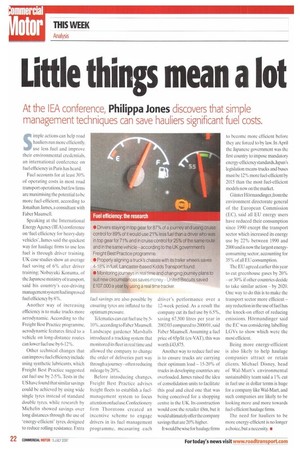Little things mea a lot
Page 24

If you've noticed an error in this article please click here to report it so we can fix it.
At the lEA conference, Philippa Jones discovers that simple management techniques can save hauliers significant fuel costs.
Simple actions can help road hauliers run more efficiently, use less fuel and improve their environmental credentials, an international conference on fuel efficiency in Paris has heard.
Fuel accounts for at least 30% of operating costs in most road transport Operations. but few firms are maximising the potential to be more fuel-efficient, according to Jonathan James, a consultant with Faber Maunsell.
Speaking at the International Energy Agency (TEA) conference on 'fuel efficiency for heavy-duty vehicles', James said the quickest way for haulage firms to use less fuel is through driver training. UK case studies show an average fuel saving of 6% after driver training; Nobuyuki Konuma, of the Japanese ministry of transport, said his country's eco-driving management system had improved fuel efficiency by 8%.
Another way of increasing efficiency is to make trucks more aerodynamic. According to the Freight Best Practice programme, aerodynamic features fitted to a vehicle on long-distance routes can lower fuel use by 6-12%.
Other technical changes that can improve fuel efficiency include using synthetic lubricants, which Freight Best Practice suggested cut fuel use by 2-5%. Tests in the US have found that similar savings could be achieved by using wide single tyres instead of standard double tyres. while research by Michelin showed savings over long distances through the use of 'energy-efficient' tyres, designed to reduce rolling resistance. Extra fuel savings are also possible by ensuring tyres are inflated to the optimum pressure.
Telematics can cut fuel use by 510%, according to Faber Maunsell. Landscape gardener Marshalls introduced a tracking system that monitored its fleet in real time and allowed the company to change the order of deliveries part way through a journey—often reducing mileage by 20%.
Before introducing changes, Freight Best Practice advises freight fleets to establish a fuelmanagement system to focus attention on fuel use. Confectionery firm Thorntons created an incentive scheme to engage drivers in its fuel management programme, measuring each driver's performance over a 12-week period. As a result the company cut its fuel use by 6.5%, saving 67,500 litres per year in 2002/03 compared to 2000/01, said Faber Maunsell. Assuming a fuel price of 65p/lit (ex-VAT), this was worth L=13,875.
Another way to reduce fuel use is to ensure trucks are carrying their optimum load — 15-20% of trucks in developing countries are overloaded. James raised the idea of consolidation units to facilitate this goal and cited one that was being conceived for a shopping centre in the UK. Its construction would cost the retailer £8m, but it would ultimately offer the company savings that are 20% higher.
It would be wise for haulage firms to become more efficient before they are forced to by law. In April the Japanese government was the first country to impose mandatory energy-efficiency standards.Japan's legislation means trucks and buses must be 12% more fuel-efficient by 2015 than the most fuel-efficient models now on the market.
G tinter Hormandinger,from the environment directorate general of the European Commission (EC), said all EU energy users have reduced their consumption since 1990 except the transport sector which increased its energy use by 22% between 1990 and 2000 and is now the largest energyconsuming sector, accounting for 35% of all EU consumption.
The EU agreed earlier this year to cut greenhouse gases by 20% — or 30% if other countries decide to take similar action — by 2020. One way to do this is to make the transport sector more efficient — any reduction in the use of fuel has the knock-on effect of reducing emissions. HO rmandinger said the EC was considering labelling LGVs to show which were the most efficient.
Being more energy-efficient is also likely to help haulage companies attract or retain clients. Michael Disney, head of Wal-Mart's environmental sustainability team said a 1% cut in fuel use in dollar terms is huge for a company like Wal-Mart, and such companies are likely to be looking more and more towards fuel-efficient haulage firms, The need for hauliers to be more energy-efficient is no longer a choice, but a necessity. •






























































































































































































